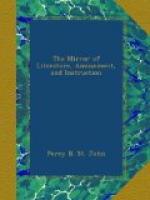In the brief but interesting accounts of this singular man, which we meet with in the ancient Chronicles of Italy, it is mentioned that he was the inventer of a new species of casque or steel basnet, denominated a cervilerium,[6] which he commonly wore under the furred or velvet cap, used by the learned of those times. The origin of this invention is curious. In those dark periods, when the belief of magic was universal, not only amongst the lower ranks, but with the learned and educated classes of the community, it was reported that the Wizard, having cast his own horoscope, had discovered that his death was to be occasioned by a stone falling upon his bare skull. With that anxiety which clings to life, he endeavoured to defeat the demon whom he served, and by repeated incantations constructed this magic casque, which he vainly deemed invulnerable. But his fate, according to the tradition of Italy, was not to be avoided. In passing a cathedral, when the bell was ringing for vespers, Michael entered to pay his devotions, and forgetful of his cervilerium, which was fixed inside his cap, uncovered as he reverentially knelt upon the stone floor. The moment of his fate was arrived. The rope of the belfry had loosened one of the carved corbels which ornamented the interior of the roof beneath which the Magician knelt; before he could remove, the sharp and heavy mass descended on his forehead, and whilst it confirmed the infallibility of his prescience, in an instant deprived him of life. Michael, however, according to the account of Benvenuto da Imola, had strength enough to lift up the stone, and ascertain its weight, after which he declared it was of the exact size he expected; and that nothing was left him but to die, which he did accordingly,[7] after very properly making his will. It is needless to remark that this fable is confuted by the return of Michael to his native country; but it appears to have been the origin of a tradition still current amongst the peasantry of Scotland, and which ascribes a miraculous power to the bonnet of the Wizard. It is curious to find the tale of the invulnerable cervilerium of the Italians, travelling on the breath of credulity and superstition into the “far north countrie” of which the Magician was a native, and only changed by tradition from the blue steel worked and welded by magic art, into the blue bonnet which was waited on by Scottish demons, who were heard wailing in mid air when it was waved by its dreaded master.
[6] Riocobaldi Ferrariensis
Historia Imperatorum—in Muratori,
vol. ix. p. 128.
[7] Benvenuto da Imola. Comment on Dante book xx. c. 115.
It is well known to the student of Italian literature, that the Magician has obtained a niche in the Inferno of Dante.
“Quel altro che ne fianchi e cosi
poco
Michele Scoto fu, che veramente
Delle magiche frode seppe il gioco.”
Another poet of Italy, but of infinitely inferior note, Theophilo Folengi, who published a collection of Latin Macaronic verses, under the fictitious name of Merlinus Coccaius, has given, in strange and almost unintelligible language, a singular picture of his incantations.




